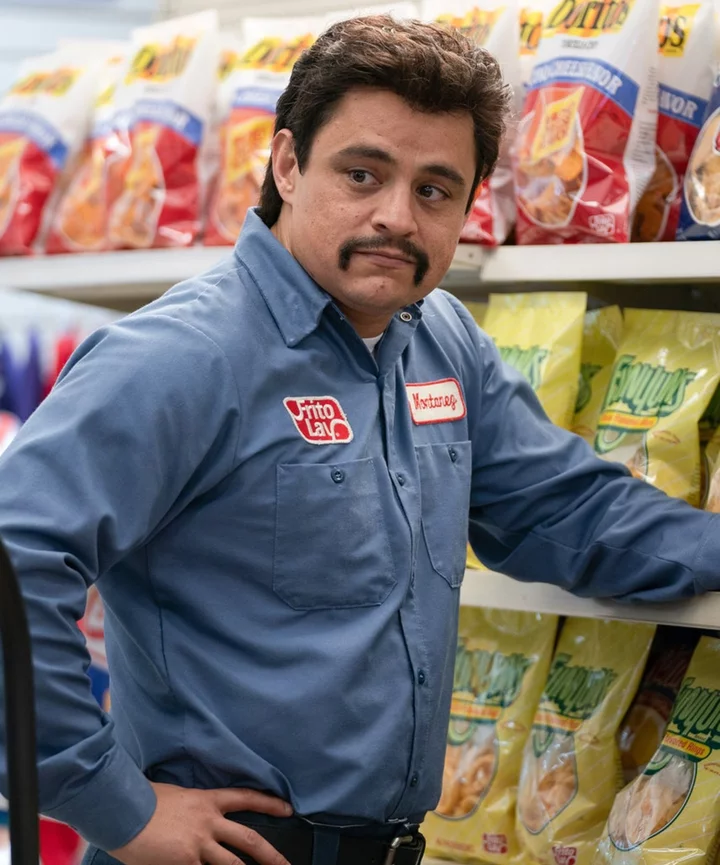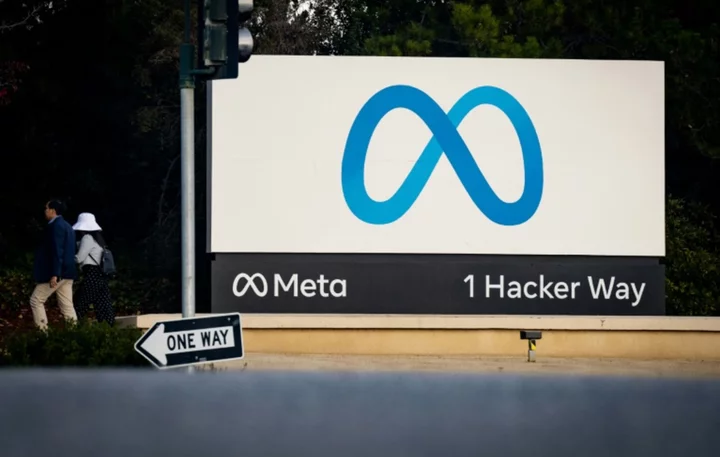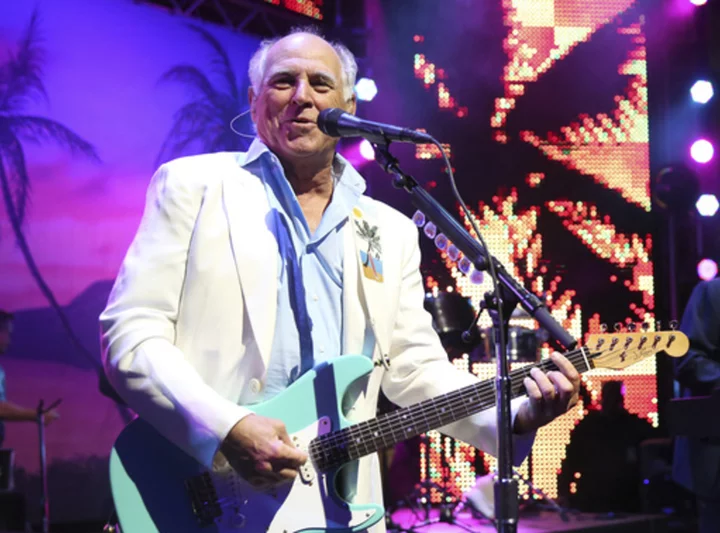I love Flamin’ Hot Cheetos — as in, I will grab a bag for myself at least once a week. Even better with limón, the snack has meant so much to the Mexican-American community since they debuted on the market in the early 1990s. Like other spicy, addictive snacks popular in Mexico and Mexican communities all over the world, Flamin’ Hot Cheetos have become something that’s uniquely ours, a representation of our ingenuity and creativity, all encapsulated on our red-tipped fingers.
With my love for the chip, I, like many others, sat down to watch Flamin’ Hot, the new film directed by fellow Mexican-American Eva Longoria about the story of Richard Montañez, the Frito-Lay janitor who was long credited with inventing Hot Cheetos, after it began streaming on Hulu on June 9. Not only was it an inspiring, rags-to-riches story, it felt authentic to us. The problem? It may actually not be a true story. A 2018 Los Angeles Times investigation found that many of Montañez’s claims were either embellished or entirely fabricated; in 2021, Montañez said that all he could vouch for was what he created in his kitchen, which wasn’t the famous Hot Cheeto recipe. Even more, the film feels like a celebration of capitalism, a system that has harmed many Latine workers much like Montañez.
In Flamin’ Hot’s telling of Montañez’s story, we meet the son of Mexican immigrants, from his childhood in an abusive home, to his adolescence as a gang member, to his career jump from janitor to a multicultural marketing executive at Frito-Lay. From the fabricated capitalist fairytale portrayed in the film to the real-life facts, it’s clear that Montañez made an impact at Frito-Lay. Company records show that while it was former employee Lynne Greenfeld who invented what we know as Hot Cheetos, Montañez helped with subsequent products in the line, like Flamin’ Hot Popcorn.
“The film feels like a celebration of capitalism, a system that has harmed many Latine workers much like Montañez.”
SOFÍA AGUILARStrangely enough, the film somewhat acknowledges the controversy around who made Hot Cheetos by showing a group of scientists trying to create the spice mixture in a lab, cut with scenes of Montañez and his family mixing, testing, and concocting their own blend at home with natural ingredients. Soon after, it’s hinted that Frito-Lay didn’t use Montañez’s recipe thanks to a throwaway line when the first batch of Hot Cheetos comes out of a machine.
As a viewer, the question for me then becomes: What was the point? Why contribute to the perpetuation of a trumped-up story that is simultaneously negated?
Moreover, like so many biographical dramas and cringy-inspirational movies before it, Flamin’ Hot maintains the problematic myth of picking yourself up by your bootstraps. It tells a story about one exceptional person, who went from a lower-level janitorial role to an exec position, and makes it seem that it can become true for everyone else, no matter their own challenges. In doing so, it erases the often-insurmountable societal and systematic problems that shut out millions from opportunities and economic advancement.
“Flamin’ Hot maintains the problematic myth of picking yourself up by your bootstraps.”
SOFÍA AGUILARRags-to-riches stories like this one celebrate systems that have historically harmed the protagonist, too. In this case, Montañez is someone who knows what it’s like to be without electricity, food, work, and basic necessities. He has first-hand experience being undervalued and exploited at work. He worked at the factory well beyond working hours to get a promotion, made his Hot Cheetos recipe on his own time and dime, and bought the snack in bulk from the store and handed them out to people in his community — all while never receiving any extra compensation for going above and beyond. And still, he’s been taught that working even harder and “thinking like a CEO,” as the movie version of Montañez says, will save him and push his family out of survival mode.
What’s more, Montañez admires the Frito-Lay CEO, who is not “like other CEOs” because he’s “nice,” overlooking the fact that he cut jobs and closed factories, wrecking the lives of people much like Montañez, in order to maintain the company’s wealth.
The film had so many chances to address the racism, xenophobia, and manipulation of the system that kept the Montañez family from the resources they needed to survive. For instance, it could have dove deeper into the story of Montañez’s wife, Judy, and the role she played in his career. As it stands, she mostly serves as a one-dimensional character, an incessant cheerleader who supports him from the sidelines. While she is not the main character, she is essential to the protagonist’s story, and she deserved more than being described as someone who “never left his side.”
“For me, perhaps the biggest disappointment was that the film didn’t take advantage of the opportunity to critique toxic work practices and instead celebrated a superficial version of success at our community’s expense.”
SOFÍA AGUILARBut, for me, perhaps the biggest disappointment was that the film didn’t take advantage of the opportunity to critique toxic work practices and instead celebrated a superficial version of success at our community’s expense. Latines have long internalized that hard work — even if it comes at a risk to one’s physical and mental health — is the key to a better life. As the children of immigrants, many of us have come to believe, both directly and subtly, the idea that you have to work twice as hard as everyone else to move forward in this country; that having sick days, mental health days, and weekends to rest is not an option; it’s laziness.
In my own childhood, my parents told me that being sick was not an excuse to miss school; I had to “suck it up” and go anyway. This continues to follow us as we grow up and enter a workforce that discourages us from having actual lives or sustainable wellness. The film’s creators perpetuate this message, irresponsibly promoting behaviors that can harm people, especially when it would benefit us all to prioritize ourselves over our jobs. We shouldn’t have to sacrifice our wellbeing to obtain financial security. We shouldn’t have to accept workplace exploitation to climb the career ladder. And we shouldn’t have to labor to prove that we deserve to exist.
“We shouldn’t have to sacrifice our wellbeing to obtain financial security. We shouldn’t have to accept workplace exploitation to climb the career ladder. And we shouldn’t have to labor to prove that we deserve to exist.”
Sofía AguilarThere were parts of Flamin’ Hot I enjoyed. For instance, Montañez’s cute and hilarious children elevated the film, especially when the family was working together to create the spice recipe. It was also refreshing to see the Mexican-American family openly condemn Montañez’s father, Vacho, for his abuse, violence, and machismo. Yet, these satisfying moments don’t override the damaging pull-yourself-up-by-your-bootstraps message that endorses the exploitation of workers and makes their lack of success feel like a personal failure rather than the intended outcomes of a capitalist system that hinges on so-called winners and losers, or wealthy and poor.
At the end of the day, just like in the film, it’s Frito-Lay that will ultimately benefit and make millions from our communities through this embellished 99-minute commercial. For me at least, I might be skipping the bag of Hot Cheetos this week.









